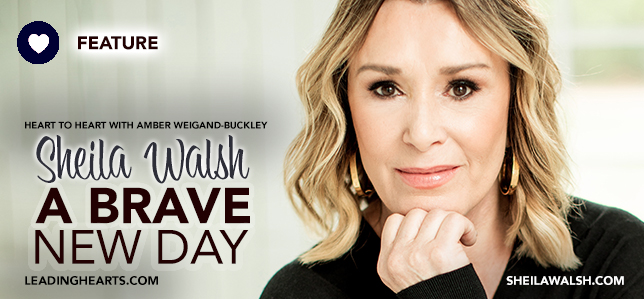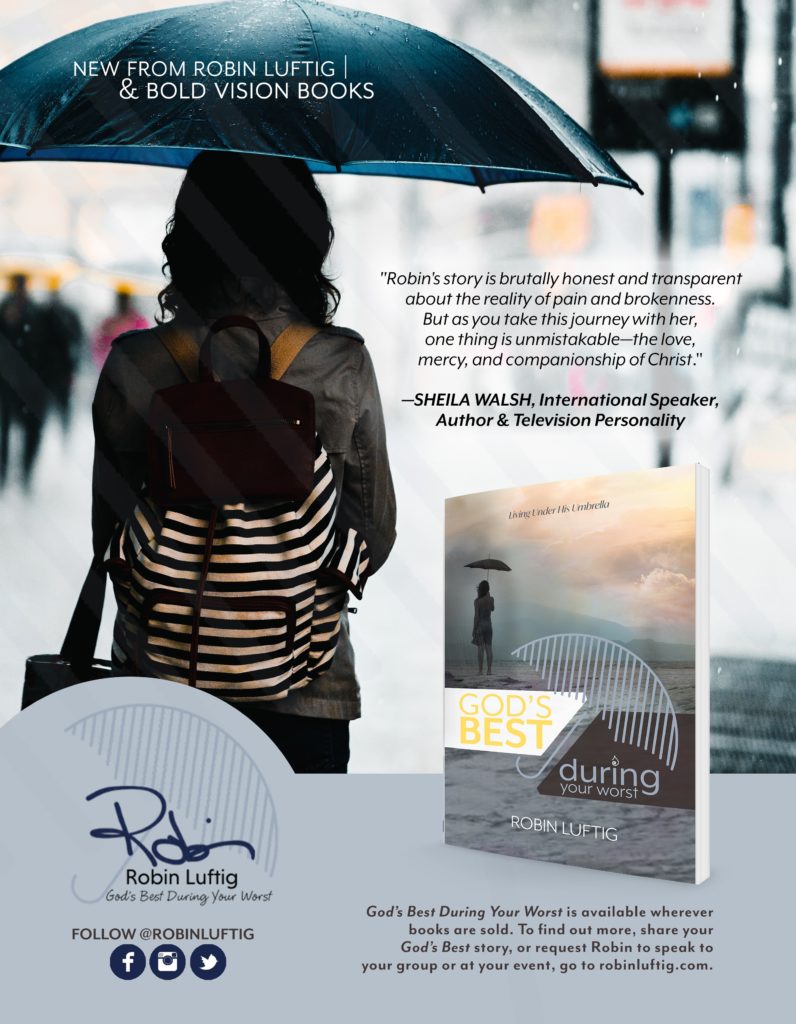
In this time we have to find fresh ways to still be who we are and do what God’s called us to do.
SHEILA WALSH IS AN AMAZING INDIVIDUAL WHO IS ALL ABOUT SHARING THE WORD OF GOD through worship with everyone around her. She does so through her many different callings as an author, speaker, television host and musician. In this interview, Sheila opens up to LH editor, Amber Weigand-Buckley, about the power of prayer, the meaning of bravery and how she was able to plant her feet on the ground to overcome an overwhelming darkness.
Q: I was thinking about the whole idea of Braveheart Worship being such a subpoena right now in the midst of this COVID-19 pandemic. We can “do church” online, but many of us are used to corporate worship. Tell me about how you worship in this time.
Sheila: Well, on my iPhone I have a worship playlist of just some of the songs that the Lord has used to just speak to my life. I’ll be honest with you, Amber. Some days I don’t want to listen.
Yesterday, for whatever reason, was just a really hard day. All my engagements had been canceled for the next two or three months, and there are some things that felt overwhelming, but I’ve learned. I gave my life to Christ when I was 11 and I’m now 63. That’s 52 years of the goodness and faithfulness of God.
The psalmist David would speak to his own soul: “Come on, bless the Lord, O my soul.” It’s almost like he was instructing himself. So, I went out and I turned on my playlist. It took me until song number three before I could feel the weight lifting.
Jesus told us in John 16 that in this world, we will have trials and we will have troubles. Each one of us will walk through something.
This pandemic is unprecedented, but Jesus told us to take heart. No matter what’s happening, no matter what we hear each morning on the news, God is still on the throne. God is still sovereign. This did not surprise Him, and He has a plan in the middle of everything.
Q: You said that a lot has been canceled on you. What things have been revived for you in this time of cancellation?
Sheila: That’s a great question, actually. No one’s asked me that. It’s finding fresh ways to still be who we are and do what God’s called us to do. On a Sunday night in our kitchen, my husband, Barry, and I started this thing we call “kitchen worship.” We put it on my Facebook page, Sheila Walsh Connect, just for 30 minutes.
Last Sunday we played a couple of songs, read some Scripture and then took Communion together. We had like 20 thousand people in America, the UK, Italy, South Africa, and Australia join us. Reading all the comments from families saying, “We all took Communion together with you” made me realize that even though we are isolated, we’re not isolated.
The Holy Spirit is with us. There are still ways we can connect. I encourage your listeners and readers, Amber, to find ways to connect even if it’s just picking up a phone and checking on someone. I love the fact that we have FaceTime and Facebook and Zoom where you can actually look in the eyes of someone.
Q: What has God been reminding you of what “brave” means in this time?
Sheila: I think that “brave” is an interesting word. We associate it with all sorts of things. I remember when my son was a little boy and he fell off the swing and scraped his knee. He said, “I’m not going to cry. I’m going to be brave.”
I think that’s the kind of thing we have to somehow muster up in ourselves. I think in particular in the Easter season, we see what brave really looks like. To me, it’s telling the truth and then longing for the will of God.
Look at how Christ modeled brave. He didn’t pretend this was going to be easy. He poured out His heart. “Father, if there is any way, let this cup of suffering pass from me.”
He was able to tell the truth and empty out the agony, and that makes space for grace.
That’s what brave looks like in these days: telling the truth to our Father, but then, having poured out all of the pain and the questions and the anguish, being able to say, “Not my will, but Your will be done.”
Q: We’re carrying a lot of weight right now, but nothing compared to the heaviness of what Christ carried. He sweat blood. How do you feel like you’re identifying with Christ as we approach the Easter season?
Sheila: Luke, because he was a physician, gave us that detail. Christ was in such agony that He sweat drops of blood. It’s called hematidrosis.
Later, on the cross, He cried out, “My God, my God, why have you forsaken me?” At that moment, for the only time in eternity, Christ was separated from His Father as the sin of the world was laid upon Him. As we were at my church rehearsing for our Good Friday service, I found myself weeping.
I had been asked to speak just for five or six minutes on the Cross and what it means. I tried to imagine what it would be like to be there on that day. Standing there, having been touched, maybe even healed, by Christ. It would have looked as if all hope were gone. Nothing in the world would make sense at that point, but they didn’t understand that they were in the middle of a miracle. They wouldn’t understand until Easter morning when Christ rose.
And I think that’s true for us, Amber. We hold on, knowing there are things in the moment that don’t make sense, but believing we’re in the middle of a miracle. Believing because of the power of the risen Christ, knowing that God is on the throne.
Q: I remember, like you, contemplating suicide and being in the middle of ministry and trusting God with all my heart and knowing inside I was breaking. There are many, even some Christians, who contemplate suicide. What would you speak to those people?
Sheila: I think back to 1992 when I spent a month in a psychiatric hospital. I even prayed that first night in the hospital, “God, if You have one ounce of mercy left for me, please take me home because I can’t do this.”I was just overwhelmed, feeling like I didn’t have the energy to fight through all that was ahead. I hadn’t gone straight to the hospital that night.
I had driven to the beach in Virginia Beach where I was living. I parked my car and took my shoes off. The beach was empty, and I walked into the water until it was up to my chest. I didn’t intend to come back out.
Only one thing stopped me. My father had committed suicide by drowning when I was five. I thought, I can’t do that to my mom again. I can’t have her get one more phone call that somebody else she loved disappeared under the waves.
In that hospital, with nothing good left to say about myself, I discovered the love of God based on nothing I brought to the table. Many nights, I would drag myself out of bed, plant my feet on the floor and open my Bible to Psalm 27.
I would read the last verse: “I remain confident of this: I will see the goodness of the Lord in the land of the living.” I didn’t feel it, but it was almost like I was declaring it over my life.
That month in the psychiatric hospital was a time of reshaping my whole life. I had spent so much of my life trying to be good enough to win or keep the love of God.
Some of you may struggle with that, but the spotless, sinless lamb of God was willing to give His life. That’s the value He places on every single one of us.




